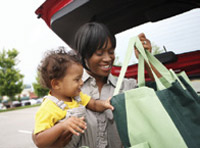This news item expired on Thursday, February 28, 2013 so the information below could be outdated or incorrect.
The trend of swapping disposable grocery bags for cloth and plastic-lined reusable bags has become an increasingly popular “green” alternative. Reusable bags reduce  waste, but how safe are they for our health?
waste, but how safe are they for our health?
The fabric or materials in reusable grocery bags can get contaminated with germs like Salmonella or E. coli from food or other items. These germs could then cross-contaminate other food or items we carry in the reusable bag and make us sick.
If you use reusable grocery bags, here are some simple steps that you can follow to reduce cross-contamination and keep yourself and your family safe from germs.
Wash reusable grocery bags often.
-
Cloth reusable bags should be washed in a washing machine using laundry detergent and dried in the dryer or air-dried.
-
Plastic-lined reusable bags should be scrubbed using hot water and soap and air-dried.
-
Check that both cloth and plastic-lined reusable bags are completely dry before storing them.
Always put raw meats into a disposable plastic bag before putting them in a reusable bag.
-
A disposable plastic bag helps contain any juices that drip off of raw meat packages, which can touch other foods and contaminate them. Disposable plastic bags are usually available in the raw meat or produce areas of your store.
-
Throw away disposable plastic bags used for raw meat immediately after use. Never reuse bags that contained raw meat or poultry.
Keep meats, fresh produce, and ready-to-eat foods separated.
-
Use separate bags dedicated for meats, fresh fruits and vegetables, and ready-to-eat foods. It’s also a good idea to keep these foods separated in your shopping cart, at the checkout line on the conveyor belt, and at home. This will help reduce cross-contamination.
-
Remember that cold food needs to be refrigerated within two hours of leaving the store or market. Cold food should be refrigerated within one hour when temperatures outside are above 90 degrees.
Store reusable bags at home in a cool, dry place, not in the car.
-
Store reusable bags in a cool, dry place, such as in your home or in the garage. Higher temperatures, like those inside of a car or a car’s trunk, can cause germs like Salmonella bacteria to grow faster.
Do not use reusable grocery bags for other purposes.
-
Bags used for groceries should be used only for food. Don’t carry items such as baby bottles, toys, gym clothes, and other items in the same reusable bags that you take to the grocery store.
These simple steps will help you to reduce cross-contamination, and help keep you and your family safe from harmful bacteria.
Questions?
By Laura Gieraltowski, PhD, MPH, Centers for Disease Control and Prevention (CDC)
Source: foodsafety.gov